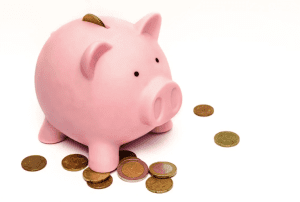People with loans, credit cards, and other debts often struggle when deciding which of these debts to pay off first, and where the money for repayment ought to come from. Paying off debt is an incredibly important financial decision, and it is important to prioritize your repayments. This article aims to give you some ideas about how to prioritize your debt repayments.
Should I Use Up My Savings To Pay Off Debt?
People often say that you need to have a 6 month emergency fund. While this is very good advice under normal circumstances, it can be worth dipping into this fund to pay off a very urgent debt, such as credit card debt.
As for long term savings, it can be a good idea to use them to pay off any debt you have with interest. This is because the interest that debts rack up tend to be significantly higher than the interest gained by money sitting in your savings account. Credit card debt, for example, will cost $220 in interest in one year (at 22%), whereas a savings account at 3% will only earn you $30 in the same time period.
If you use your savings to pay off your debt, you will save more money in the long run. On the flipside, if you prioritize saving over paying off your debts, it will cost you more in the long run.
Some exceptions to this rule are cases in which the cost of debt is lower than the benefit gained by saving, and cases in which you are locked into debt that punishes you for early repayment (such as some mortgages).

What Are Priority Debts?
Priority debts are debts that carry the most serious consequences if you do not pay them. They are not necessarily the largest debts, or the ones with the highest interest rates. However, they are the debts that cause you the most severe implications if you cannot repay them.
What Are Some Examples Of Priority Debts?
Priority debts include:
- Court fines
- Taxes such as income tax
- Gas and electricity bills
- Income Tax, National Insurance and VAT
- Mortgage, rent and any loans secured against your home
Why Should You Pay Priority Debts Off First?
The consequences for failing to pay priority debts off on time can be severe. You can be visited by bailiffs, receive court summons, have your heating and light cut off, lose your home, or even be made bankrupt.
What Are Non-Priority Debts?
Non-Priority debts are debts for which the consequences of late repayment are less serious. Your creditor can still eventually take you to court or hire bailiffs to collect your money, so they should not be taken lightly. Failure to repay them will also likely damage your credit history, which could cause you severe problems later down the line.
What Are Examples Of Non-Priority Debts?
Your non-priority debts include:
- Bank overdrafts
- Money borrowed from your friends and family
- Credit card loans, store card loans, payday loans
- Catalog loans, home credit loans, in-store credit loans
- Water and sewerage bills
The reason that water sewerage bills are considered non-priority debts but gas and electricity are not is because your water and sewage cannot be cut off in the same way as your other bills can. It is an essential household bill, however, so you should still consider it a priority debt if you are in a position where you are able to.
In Which Order Should I Pay Off My Other Debts?
There are several ways you can consider approaching debt repayment. Here are some sensible methods you should consider:
Highest Interest Rate First
Each debt you owe will come with a different interest rate. The higher the interest rate, the more money you will end up paying in the long term. Due to this, many people advise prioritizing paying off the highest interest rate debt first.
This is a sensible approach. However, with this method you should still try to keep up with making the minimum payments on all your debt, despite prioritizing the higher-interest debts when it comes to any extra cash you might have.
Smallest Balance First
Paying off a debt in full feels really good. Some advisors recommend starting out by paying off your smallest debt first, and working your way up. This means you can avoid getting overwhelmed by a mountain of debt, taking it step by step instead.
Paying off an account entirely feels amazing, and it means you will be motivated to tackle the next one with the wind behind your sails. It also comes with the added benefit of getting rid of one set of debt collection emails, texts, and calls about that particular account.
Finally, paying off a debt entirely will show the account as closed on your credit report. This can be a great benefit if this account was previously showing up as delinquent.
Most Stressful First
Some lenders apply more pressure to the people who owe them money, sometimes to the extent where borrowers feel chronically stressed or harassed. Other types of stressful debts might be those that hurt your credit score most.
This kind of emotional state can have a huge impact on your mental and even physical wellbeing. Although conquering the highest interest debt first sounds like the best choice on paper, sometimes it is okay to prioritize your health and wellbeing.
Many people choose to begin by paying off the account that is hounding them most. This is a perfectly valid way to prioritize your repayments.
Was this article helpful?
Justine is a full-time writer with lots of expertise and a wealth of experience in the financial world. In particular, she specializes in household income and consumer finance across the United States. Follow her articles for useful advice and top tips, guides on how to save money and lots more.

